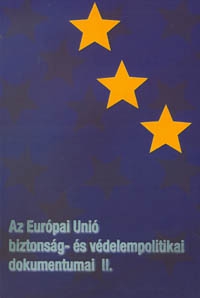Ouvrage collectif
Le concept d’autonomie stratégique, politique, opérationnel et technologico-industrielle constitue le cœur même du lien étroit entre les aspects substantiel-existentiels et pratique-exécutifs de la PESD.
La première partie de l’analyse regarde de plus près « Les dilemmes existentiels du modèle de sécurité européen ». Elle étudie respectivement les questions « Européen ? » (européité particulière, européité commune, européité autonome) ; « Sécurité ? » (ce qu’il faut gérer, quels instruments utiliser, de quelle manière faut-il le gérer) ; et « Modèle ? » (l’Union en tant qu’architecture de sécurité, l’Union en tant que précédent de sécurité). L’existence ou la non-existence du modèle de sécurité européen n’est, en fait, qu’une fausse question : car c’est en réalité l’existence ou la non-existence de la volonté politique prête à l’assumer qui se pose derrière elle. Or, rien ne justifie que les Européens, devenus des géants économiques grâce à leur intégration, se résignent à rester pour toujours des nains politiques. Qu’ils ne mettent pas en œuvre les innombrables instruments à leur disposition, les uns plus efficaces que les autres, afin d’influencer les processus globaux conformément à leur vision. Que la politique de sécurité et de défense européenne, conçue à l’origine pour donner plus de crédibilité à l’action extérieure de l’UE, se décrédibilise d’elle-même faute d’avoir le courage d’assumer sa propre indépendance.
La problématique du caractère proprement européen relance, en pratique, deux groupes de dilemmes non résolus : les incertitudes liées à l’intégration et aux relations transatlantiques. En effet, il s’agit d’un côté de savoir à quel point les Etats membres de l’UE sont-ils prêts à avancer dans le domaine du partage de souveraineté (l’essence même de leur intégration) afin de promouvoir d’une manière plus efficace leur approche commune. De l’autre, la question est de voir s’ils sont prêts à assumer leurs positions communes même si cela rend impossible l’alignement inconditionnel sur les Etats-Unis, sur tel ou tel dossier international. Pour ce qui est de ce dernier problème, il faudrait rappeler quelques évidences. Compte tenu des rapports de force transatlantiques par le passé et dans le présent, il est inévitable que le modèle de sécurité européen soit défini par rapport aux Etats-Unis. Cela ne veut en aucun cas dire contre les Etats-Unis.
Premièrement, l’approche européenne n’a absolument pas besoin d’une image d’adversaire, quelle qu’elle soit, pour justifier sa légitimité et sa pertinence. Aussi, du fait de la coïncidence fréquente des intérêts et des valeurs, l’Europe et l’Amérique sont, à beaucoup d’égards, des partenaires naturels. En effet, l’un des efforts communs des Européens est justement d’essayer d’obtenir la coopération de leur allié d’outre-Atlantique sur les divers dossiers internationaux. Les malentendus viennent donc tout simplement du fait, qu’aux yeux de ceux qui sont pour la prolongation de la situation actuelle de subordination et de dépendance, toute aspiration à l’autonomie signifierait un acte hostile. Ils la qualifient d’anti-américanisme, tout comme le constat qu’en politique internationale il y a et il y aura des dossiers sur lesquels les Européens sont d’accord avec les Américains, et il y en a et il y en aura d’autres sur lesquels ils ne le sont pas.

A tout cela s’ajoute encore une considération plus lointaine, sur l’évolution de l’ordre mondial. La planification stratégique américaine compte, depuis le début des années 1990, avec l’émergence d’un compétiteur de même niveau. Ces derniers temps, les théories du chaos ou de vacuum (brandissant le spectre de l’anarchie en cas d’un déclin soudain des Etats-Unis) ont, elles aussi, gagné de l’importance. De surcroît, l’actuelle concentration de puissance est déjà, en elle-même, porteuse de risques. Comme l’a dit le Président français Jacques Chirac : « Une société où il y a un seul puissant est toujours une société dangereuse et qui provoque des réactions. » En d’autres termes : l’absence d’alternative et de pluralisme réels suscite inévitablement des frustrations et mène à des tentatives de compensation asymétriques.
La façon la plus évidente pour esquiver les scénarii mentionnées plus haut serait la transformation d’Europe en un acteur international indépendant, à part entière. D’une part, pour rendre l’ensemble du système international plus équilibré, donc plus durable et moins irritant. De l’autre, pour que les fondements d’une structure multipolaire, coopérative et multilatérale (contraignante pour chacun, non pas interprétée et instrumentalisée sur la base de la loi du plus fort) puissent se mettre en place avant le changement de paradigme annoncé. Par conséquent, l’autonomie totale – stratégique, opérationnelle et technologico-industrielle – de l’Europe est une nécessité à la fois pour des raisons pragmatiques directes, prospectives lointaines et de légitimité intérieure et extérieure. Ce qui est plus, c’est la seule possibilité pour avoir une relation transatlantique saine, dans laquelle les deux parties participent sur la base de leurs propres priorités, approches et méthodes, sans les fardeaux de la domination et les complexes de la subordination.
En ce qui concerne la notion de sécurité, « la politique étrangère structurelle » de l’UE est guidée par un « égoïsme éclairé ». L’UE ne sépare pas les soi-disant nouvelles menaces de leur enracinement politique, économique et social. Sur le plan de l’arsenal, la composante militaire est évidemment nécessaire, mais « le manque de confiance des Européens et les critiques dont ils sont l’objet résulte en grande partie d’une conception erronée. Pour une raison inexplicable, l’exemple américain est cité comme référence pour les doctrines et l’amélioration des capacités européennes, et une pression énorme s’exerce sur les Européens dans le cadre du processus de transformation actuelle de l’OTAN pour qu’ils adoptent l’approche américaine. Or, non seulement les ambitions et les priorités de l’Europe ne coïncident pas avec l’attitude américaine (plus orientée vers les interventions massives, l’écrasante domination et la supériorité technologique), mais elles sont tout aussi pertinentes pour gérer des défis du 21ème siècle que les conceptions d’outre-Atlantique. Voire plus encore.
Ce n’est pas un hasard que les Européens évoque volontiers leurs propres expériences lorsqu’ils soulignent l’importance des solutions d’ensemble, basées sur la légitimité et la légalité. Ce qui s’est passé en Europe depuis un demi-siècle n’est en réalité rien d’autre que l’expérimentation d’un modèle de sécurité durable. Mais pour que le multilatéralisme institutionnalisé (non pas le multilatéralisme théâtral utilisé comme une feuille de figue) puisse fonctionner au niveau international, il faudrait des rapports de force plus équilibrés, dans lesquels l’Europe elle-même deviendrait l’un des centres de puissance censés garantir l’équilibre.
La seconde partie de l’analyse examine « Les divers aspects de la mise en œuvre de la PESD » (missions, architecture institutionnelle, capacités militaires, base technologico-industrielle). Après avoir passé en revue les éléments essentiels de ces divers domaines, l’accent est mis sur le fait que la mise en place d’un marché européen d’armement et le maintien d’une base technologico-industrielle indispensable à l’autonomie en matière de défense sont les conditions sine qua non. Il s’agit du pilier matériel pour le développement de l’Europe en un acteur international à part entière ; pour l’autonomie de décision et d’action évoque dans la déclaration de Cologne lançant la PESD ; de même que pour l’indépendance en général, tel qu’elle figure dans les traités de l’Union.
Texte complet en hongrois.
(In: Az Európai Unió biztonság- és védelempolitikai dokumentumai vol. 2, ed. L. Póti- P. Tálas, Budapest, SVKK-Chartapress, 2005)
Tags:
défense européenne




















